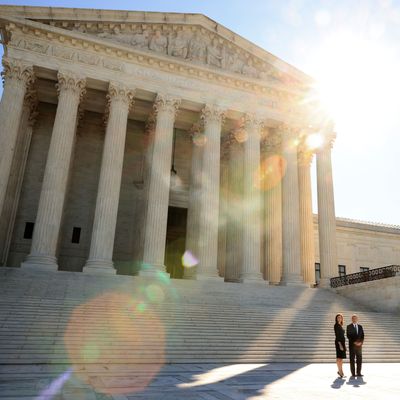
Perhaps it’s just a coincidence that three members of the Supreme Court’s dominant conservative bloc have complained publicly in recent weeks about criticism of SCOTUS for its increasingly partisan and ideological tendencies. After all, liberal-bloc stalwart Justice Stephen Breyer preceded Justices Clarence Thomas, Samuel Alito, and Amy Coney Barrett in kvetching about media and activist incomprehension of the Court’s high-minded, almost holy mission.
But it’s possible the conservatives are anticipating some decisions in the term that began on October 4 which could ratchet up criticism of the Court’s willingness to overturn precedents on behalf of a partisan or ideological agenda, and they are trying to discredit such criticism early and often.
It could indeed be an epochal term. Vox’s Ian Millhiser has identified no fewer than nine issues on which the Court could hand down a landmark decision. But as detailed below, there are three areas where the potential for a radical departure in constitutional law is especially high. In all three, moreover, the Court’s rightward lurch reflects not just trends in conservative legal circles, but priorities of the Republican Party on matters in which the two major parties are almost completely polarized.
The long-awaited reversal of abortion rights
To cite the best-known example first, the conservative majority of the Court is poised to reverse or at least significantly undermine 47 years of precedents supporting a constitutional right to previability abortions in Dobbs v. Jackson Women’s Health Organization, a case arising from a Mississippi law banning all abortions (including those resulting from rape or incest) prior to 15 weeks of pregnancy.
As in other areas, the slow accumulation of conservative power on the Court has finally reached the point of sustaining a leap backward in time: Thomas and Alito have long telegraphed their contempt for Roe v. Wade and Planned Parenthood v. Casey. But it’s the addition of the three Trump justices, all of them carefully vetted by the Federalist Society, that has brought us to this juncture. Elections have consequences.
If there was any doubt where the Court was going on abortion, it may have been signaled by the casual willingness of five conservative justices to let an even more radical Texas law take effect this September, on highly technical grounds involving the law’s strange enforcement provisions. It’s as though SCOTUS isn’t even bothering to hide its path toward a decision in Dobbs that will truly roil the nation.
Here comes Second Amendment absolutism
Just as the 2008 decision in District of Columbia v. Heller revolutionized Second Amendment jurisprudence by recognizing a personal individual right to bear arms, New York State Rifle and Pistol Association, Inc. v. Bruen could sweep away government’s power to regulate weapon possession and use. The accession of Kavanaugh and Barrett to the Court has brought the latter-day Second Amendment absolutism sweeping the Republican Party and the conservative movement right up to the brink of a landmark decision that could strike down a variety of gun-licensing requirements, extending gun rights beyond self-defense in the home to any number of other circumstances.
The Court probably won’t embrace the ultimate radical idea of the Second Amendment being designed to keep open the possibility of an armed revolution against the federal government, but constitutional law could be on that path.
A large blow to agency regulatory powers could finally be struck
There is probably no cause dearer to the hearts of conservative legal theorists than overturning “Chevron deference,” a long-standing precedent whereby federal courts give a wide berth to agency interpretations of mandates set out in congressional laws. This goal also meshes with Republican political priorities, since its chief target is the kind of regulatory powers exercised by “specialized” federal agencies like the Environmental Protection Agency and the Department of Labor, which many businesses resent and resist. This deference is endangered by a potential decision in American Hospital Association v. Becerra, which involves Medicare reimbursement rates for certain prescription drugs.
As Millhiser says, if the Court overturns Chevron deference, it will represent an “earthquake” and a huge inducement to litigation challenging all sorts of critical federal regulatory powers.
If SCOTUS issues sweeping decisions in all three of these areas, the term will go down in history as representing the most audacious burst of judicial activism since the Warren Court. Should it come to pass, the composition and direction of the Court will finally become as vital an election issue for Democrats as it has already become for Republicans.






























